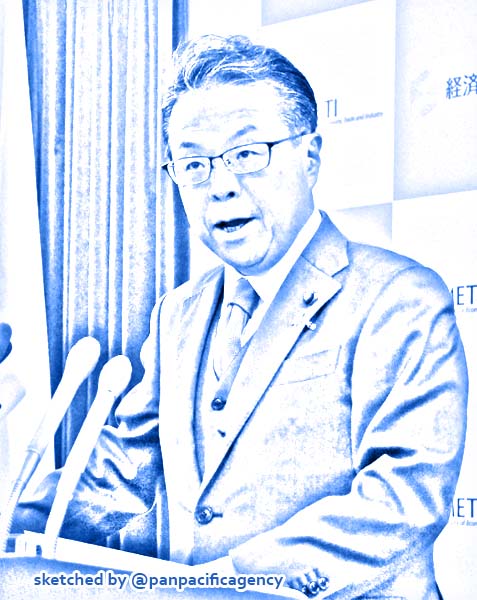Japan trade minister questions S. Korean decision on list removal

Japanese Economy, Trade and Industry Minister Hiroshige Seko (Kyodo). Sketched by the Pan Pacific Agency.
TOKYO, Aug 13, 2019, Kyodo. Trade minister Hiroshige Seko on Tuesday questioned South Korea’s decision to remove Japan from a list of trade partners that receive preferential treatment, saying the reasoning behind the move was “entirely unclear,” reported The Mainichi.
“The South Korean Ministry of Trade, Industry and Energy has announced it is tightening trade controls on Japan, saying we are not complying with the basic principles of the international export control regime,” Seko wrote on Twitter.
“But even after watching South Korea’s press conference, it is entirely unclear on what grounds they are making this claim.”
South Korea said Monday it will take Japan off its list of 29 countries that enjoy an expedited application process for exports of certain goods around next month. The ministry lists around 1,700 “strategic goods” that will be subject to the restrictions.
“It is difficult to work closely with countries that use systems that deviate from the basic principles of the international export control system or continue inappropriate cases,” industry minister Sung Yun Mo said in announcing the move.
The move is being seen as retaliation for Japan’s recent tightening of export controls against South Korea.
On July 4, Japan imposed restrictions on South Korea-bound exports of materials crucial to the production of semiconductors and display panels, citing national security concerns. Japan doubled down on Aug. 2 by deciding to remove South Korea from a “white list” of countries that enjoy minimum restrictions on purchasing goods that can be diverted for military use.
Retweeting Seko’s post on Tuesday, Masahisa Sato, Japanese senior vice foreign minister, added that it is also unclear what inappropriate cases South Korea was referring to.
Relations between the neighboring countries have fallen to new lows following South Korean court decisions ordering compensation for Koreans forced to work in Japanese factories during Japan’s colonial rule of the peninsula from 1910 to 1945.